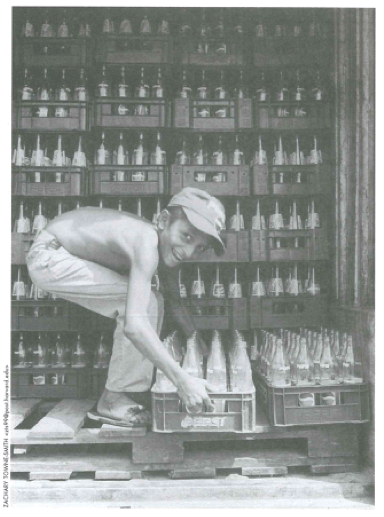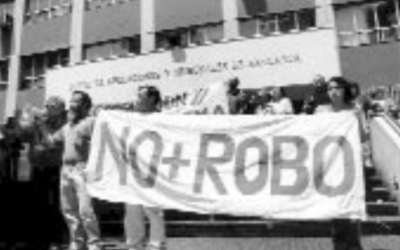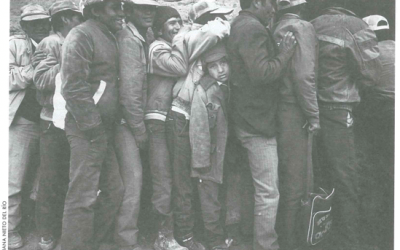Venezuela in the 1980s, the 1990s and beyond
Why Citizen-Detached Parties Imperil Economic Governance

Working in Venezuela: Stacking Coca-Cola
Venezuela used to be considered a miracle country. Until the early 1980s, it was one of the only four Latin American countries certified by the World Bank as an upper-middle-income economy. It was also a stable, center-left democracy, quite an oasis in a region plagued by authoritarianism, insurgency, or unrest.
Today, Venezuela is in ruins. It is one of the few Latin American countries to have had, not one, but two “lost decades:” the 1980s and the 1990s. Never really able to recover from currency and debt crises in the 1980s, Venezuela plunged further into economic chaos in the 1990s (see table). Inflation remained indomitable and among the highest in the region, economic growth continued to be volatile and oil-dependent, growth per capita stagnated, unemployment rates surged, and public sector deficits endured despite continuous spending cutbacks. Real wages today are almost 70 percent below what they were 20 years ago. In eight of the last 12 years, Venezuela suffered some sort of economic emergency-a critical fiscal deficit, a banking crisis, a currency crisis, an economic recession or a combination of these. More than two-thirds of the population now live below poverty levels. A recent report estimates that, for an average Venezuelan with 12 years of schooling, the probability of ending up poor is 18.5 percent, up from 2.4 percent only a decade ago. Education-a common antidote against poverty-has simply ceased to work.
This economic plunge has been accompanied by a gradual, and as of 1998, terminal collapse of the party system. The once-invincible political parties, Acción Democrática (AD) and Copei, were summarily defeated in a series of elections in 1998-1999. The power vacuum has been filled by the most anti-establishment political figure to emerge in 1998, Hugo Chávez Frías. A not-too-repentant coup-maker himself, Chávez won the December 1998 presidential elections and, in a hastily convened elections for a constitutional assembly, his supporters captured 93 percent of the seats.
I argue that these two outcomes-economic collapse and party system collapse-are intimately related. Venezuela’s repeated failure to reform its economy made existing politicians increasingly unpopular, who in turn responded by privileging populist policies over real reforms. The result was a vicious cycle of economic and political party decay, ultimately paving the way for the rise of Chávez.
|
Venezuela’s second “lost decade” – the 1990s
/a Inter-American Develoment Bank /b ECLAC /c Congreso de la República /d Cordiplan |
Venezuela’s Ax-Relax-Collapse Reform Cycles
Why hasn’t Venezuela escaped its economic malaise? The answer is not for lack of trying. Every administration since the early 1980s has come to office hoping to introduce economic correctives, to the point where almost every policy approach has been tried: heterodox stabilization (1985-1988), shock therapy (1989-1992), gradualism (1996-1998), reforms by executive “special powers” (early 1980s, 1993-1994, 1998), reforms by negotiations with opposition parties (1996-1998), stabilization through price controls (1994-1996), deep trade liberalization (1990-1993), concessions to economic losers from trade liberalization (1994-1998), and direct subsidies to vulnerable sectors (1990-1992). Nothing has worked. These policies failed either to deliver a lasting solution or to last long enough to achieve results.
Essentially, Venezuela has been stuck in an ax-relax-collapse cycle of reform. Each cycle begins with the eruption of an economic crisis, to which the government responds by implementing harsh cutbacks and adjustments-the “ax.” After some initially positive results, the reforms soon lose momentum, becoming either haphazardly implemented or prematurely abandoned-the “relax” stage. This culminates in yet another economic crisis-the “collapse.” With the launch of “Agenda Venezuela” in 1996, Venezuela embarked on its fourth such reform cycle since 1979, succumbing shortly after to the same pattern of relaxation and collapse. The main difference was that, this time, the economic collapse (in 1998) was the worst ever.
Venezuela is thus neither a case of reform avoidance nor of neoliberal transition, but rather of reform non-consolidation. It is the prototype of a “reform-lagging” country. Reform-lagging countries develop special political problems that complicate the capacity of the political system to manage the economy.
One such problem is a chronic decline of citizen confidence in the state and politicians. When states repeatedly falter on their promises to fix the economy, economic agents lose confidence in state authorities, undermining their desire to cooperate with future reforms. Another problem of repeated reform failures is that reform opponents gain ground. Reform opponents argue, groundlessly but convincingly, that ailments are caused by the attempted reforms, conveniently avoiding the real diagnostic-that ailments are the result of not completing the reform process. Venezuela’s two most recent presidents (Rafael Caldera, 1994-1999 and Chávez, 1999-present) came to office by invoking this fallacy. Repeated reform failures also make common citizens equate adjustment, a word that they had been hearing for the past twenty years, as wasted sacrifice, as one more scam by which traditional, corrupt politicians pass on the costs of adjustment to the citizenry, only to squander the resulting savings. Confidence in the state and professional politicians tends to evaporate in reform-lagging countries.
Political Party Decay as a Cause and Effect of Repeated Reform Failures
When reform effort collapse, politicians become increasingly concerned about “vote flight” and reluctant to embrace harsh but necessary reforms increases. They step up populist appeals, on the mistaken assumption that votes could be regained through populist handouts rather than by demonstrating competence in resolving public policy issues. This sets the stage for the failure of the next round of reforms, which in turn, lowers the popularity of parties even further. In a nutshell, this is what has happened in Venezuela since the early 1980s.
Dominant parties reacted to their decline in popularity, not by renewing themselves, but by actually becoming increasingly closed off to new leadership and initiatives. Internal party rules exempted party leaders from having to compete electorally to earn leadership positions, thus diminishing the incidence of rotation of party leaders, even as parties suffered setbacks at the polls. This distinguished Venezuela’s major parties from the leading party in Mexico, the PRI, which, although less democratic, always underwent rotation of leaders with every new administration. In 1993 Caldera capitalized on the anti-party sentiment of the population by cobbling together an alliance between a small, leftist party (Movimiento al Socialismo, MAS) and a last-minute coalition of independent leftist-nationalist forces (Convergencia). Once in office, this coalition proved to be fragmentation-prone and reform-adverse. Caldera had no option but to court the very same parties that he had campaigned against-AD and Copei. These parties, however, sold their support at a very high price, consenting only to tepid reform in return for populist concessions.
The Demise of the Party System and the Prospects for Breaking the Cycle
The electoral results of 1998-1999 demonstrated, not so much the popularity of the new president, which is unquestionably high, but rather the repudiation of traditional parties, which was overwhelming. Chávez has won elections comfortably, but 42.6 percent of voters still voted against him. In the Constitutional assembly, his candidates obtained 61 percent of the total popular vote, with an abstention rate of 54.
What is clear, nonetheless, is that the old parties were completely repudiated, both in the presidential elections and the elections for the delegates to the constitutional assembly in July 1999. Unwilling to align themselves with existing political parties, opposition candidates ran as independents in the elections of July 1999. Opposition voters thus faced a plethora of opposition candidates from which to choose. Their votes were dispersed among many candidates, making it difficult for opposition candidates to amass enough votes to win seats.
Does the demise of the old party system and the accumulation of power by Chávez enhance Venezuela’s prospects for escaping its ax-relax-collapse policy cycles? So far, Chávez has been non-committal about economic intentions. This summer he declared: “The year 2000 will be the year of the economy,” indicating that he would not be bothered with the economic crisis at least during his first year in office. The official economic program calls for a “humanistic” economy, which is as vague a predictor of what is to come as one could imagine.
If Chávez ever converts to market economics, as most Latin American populist-militaristic leaders did in the 1990s, he will clearly enjoy favorable political assets-a devotional following, a demoralized opposition, and high levels of reserves in the Central Bank. However, not everything is idyllic. Chávez could still be encumbered by the same political constraints that fettered previous presidents.
One constraint is the propensity of the ruling coalition to fragment, especially if market reforms are ever announced. Chávez’s ruling coalition, Polo Patriótico, is almost identical to Caldera’s- an ad hoc, last-minute mélange of small, marginal parties of the left and the military sector, with support from defecting factions of some traditional parties. This coalition is also susceptible to the same structural instability as the preceding one. None of the parties in the Polo Patriótico has developed a strong political machine, which might compel Polo’s leaders to use state resources to build political machineries. This is tantamount to pressures for populism from within.
The other problem is the non-renewal of the old left-Chávez’s closest allies. Like the traditional politicians of AD and Copei, old left leaders have been historically exempted from the need to compete for votes in order to justify their leadership positions within their respective parties. Until the 1980s, the old left held a permanent minority status-a status that its leaders resigned themselves to. This resignation meant exempting themselves from pressures for self-renewal and elite rotation. The pay-offs for self-renewal were simply too small. Regardless of how much renewal there was, they would still fail to defeat the two largest parties.
In 1993, the old left came to power almost by accident-by cleverly aligning themselves with the most probable victor, Rafael Caldera. And despite their disastrous performance in office during 1994-1998, they still managed to retain power, again by conveniently bandwagoning with the most likely winner, Hugo Chávez.
The old left has always been on the fringe of political competition, and hence, insulated from mechanisms that would penalize, and possibly expunge, political vices. It is, therefore, unclear that the old left has freed itself of the same excesses that doomed the politicians of traditional parties-a propensity to privilege populism over real solutions to economic predicaments, to arrive at decisions through closed-doors deliberation, to create impediments for the entry of new talent and ideas, to be disdainful of dissent. These are the same vices that precluded Venezuela’s old political leadership from responding responsibly to continued economic crises.
Much has changed in Venezuela in the last year. But one of the country’s most pernicious political scourges-the capacity of political elites to retain leadership position regardless of electoral contests- still lingers. As long as this democratic deficit endures, don’t expect Venezuela’s fiscal deficits to go away that easily.
Fall 1999
Javier Corrales (Harvard Ph. D. 1996) is Assistant Professor of Political Science at Amherst College, Amberst, Massachusetts. Parts of this piece draws from “Reform-Lagging States and their Refusal to Devalue” forthcoming in Riordan Roett, ed., tentatively titled Currency Crises and Latin America.
Related Articles
Poverty or Potential?
Teresa stops me three blocks from Nueva Imperial’s main plaza on a quiet Wednesday morning, eager to chat. She is wearing a light blue sweater and a matching blue headband glowing slightly against her dark black hair.
Infections and Inequalities
I read Paul Farmer’s book while on a short visit to Venezuela, and found that setting, at this historical moment in time, particularly pertinent and highly conducive to the arguments Farmer…
Proclaiming the Jubilee
Carmen Rodríguez heads the Charismatic Movement in a sprawling shantytown parish south of Lima, Peru. She and other lay leaders of the Lurín Diocese have been preparing for the…



